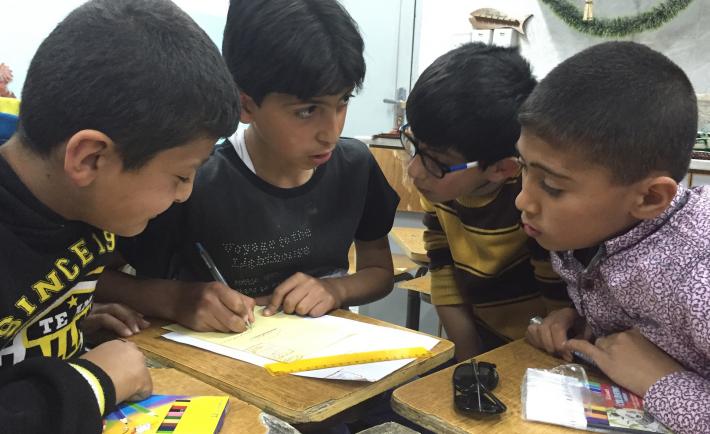
150 schools in Jordan are implementing NDI’s Youth Political Participation Program (Ana Usharek Schools) involving 3,053 students across Jordan. The program aims to promote civic education among students, involve them in projects serving their communities and introduce ways to effectively participate in political and public life. Photo Credit: Dareen Al-khoury
Each week NDI’s Citizen Participation team provides a resource to assist NDI staff in meeting the objectives of their programs. The past month’s resources discussed the need to better understand the thinking and working politically (TWP) framework in development programming, described the importance of integrating politics into development efforts to improve service delivery for poor populations, introduced a research and advocacy framework to support community organizing, and shared effective strategies to improve social accountability approaches. These resources provide tools and insights that can equip citizens and civil society with politically informed approaches to achieve better development outcomes and facilitate positive change.
 Thinking and Working Politically: From Theory Building to Building an Evidence Base by the Development Leadership Program discusses the steps required for researchers, policymakers and practitioners to better understand the impact and significance of TWP for developmental change and program implementation. It includes a brief introduction to TWP, a discussion on current TWP literature and gaps in the existing evidence base and a four-level analytical framework for assessing TWP programming, ranging from political context and sectoral level to organizational level and individual level. A politically-informed and systems-changing mindset can help make development practices and outcomes more effective and drive positive change.
Thinking and Working Politically: From Theory Building to Building an Evidence Base by the Development Leadership Program discusses the steps required for researchers, policymakers and practitioners to better understand the impact and significance of TWP for developmental change and program implementation. It includes a brief introduction to TWP, a discussion on current TWP literature and gaps in the existing evidence base and a four-level analytical framework for assessing TWP programming, ranging from political context and sectoral level to organizational level and individual level. A politically-informed and systems-changing mindset can help make development practices and outcomes more effective and drive positive change.
 Innovating for pro-poor services: Why politics matter published by the Overseas Development Institute explores how politics can be incorporated into development efforts to foster and support innovation that improves service delivery for poor people. Using case studies from a wide range of sectors, the report includes useful analysis on navigating the domains of politicians, political parties and government, as well as power dynamics within markets, organizations, communities and households. The recommendations provided can help support the development of assessment frameworks for politically smart and sustainable processes and practices to address service delivery failures.
Innovating for pro-poor services: Why politics matter published by the Overseas Development Institute explores how politics can be incorporated into development efforts to foster and support innovation that improves service delivery for poor people. Using case studies from a wide range of sectors, the report includes useful analysis on navigating the domains of politicians, political parties and government, as well as power dynamics within markets, organizations, communities and households. The recommendations provided can help support the development of assessment frameworks for politically smart and sustainable processes and practices to address service delivery failures.
 Research for Organizing by Urban Justice Center introduces participatory action research (PAR) to improve efforts by citizens and CSOs to help facilitate change in their communities. This toolkit can be useful in analyzing and documenting the problems that citizens and civil society see in their communities, generating data and evidence in order to build collective knowledge, and promoting informed and strategic action for positive change. Through various activities, tools and case studies, the toolkit emphasizes the role of research in community organizing and allows individuals and organizations to become the experts about the issues that face their own communities.
Research for Organizing by Urban Justice Center introduces participatory action research (PAR) to improve efforts by citizens and CSOs to help facilitate change in their communities. This toolkit can be useful in analyzing and documenting the problems that citizens and civil society see in their communities, generating data and evidence in order to build collective knowledge, and promoting informed and strategic action for positive change. Through various activities, tools and case studies, the toolkit emphasizes the role of research in community organizing and allows individuals and organizations to become the experts about the issues that face their own communities.
Social Accountability: A practitioner’s handbook by Basel Institute on Governance is designed to help practitioners design effective and sustainable social accountability strategies to support citizens and CSOs in their efforts to promote public integrity and increase government accountability in service delivery. With case studies from the Philippines, Tanzania, Serbia, and Mexico, the handbook emphasizes the understanding of the local context in developing effective social accountability strategies. It then provides guidance on how to match local characteristics and needs to appropriate social accountability frameworks and interventions. It also includes assessment tools, worksheets and methodological notes that could provide important guidance to program efforts.

